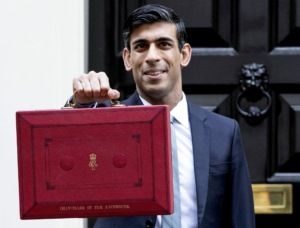News
Post-Brexit blues: British expat re-enfranchisement comes with a sting in the tail
This article is more than 4 years old.
However, return of voting rights could cause severe inheritance tax complications, warns leading consultancy

London, United Kingdom. Chancellor of the Exchequer Rishi Sunak holds up the red box outside Number 11. Credit: Harriet Pavey / Flickr
UK Chancellor Rishi Sunak’s 2021 budget last week confirmed that British citizens living abroad, who are not residents of the UK for tax purposes, can qualify to vote on an “indefinite basis” in future UK elections.
For British expats who have long been lobbying to change a 2002 law specifying that only non-residents who have lived overseas for less than 15 years are eligible, this is good news.
But the law change also includes a significant sting in the tail that could have far-reaching consequences.
Liable for treasury tax take
Speaking to the Financial Times, Robert Salter, the associate director of the British financial advisory firm Blick Rothenberg, advises caution.
“British expats overseas should consider carefully whether they wish to take advantage of this extended franchise because it could cause problems in the future and mean they are liable for UK taxes and in particular inheritance tax,” he warned.
“Wealthier expats”, who may have moved overseas to minimise their UK tax exposure, are most at risk, he said.
“Anybody who is UK domiciled in accordance with our common law, will – on death – be subject to UK Inheritance Tax on their worldwide assets,” he continued.
“Even when one has lived overseas for many years, ongoing links to the UK (such as remaining registered to vote in the UK), may be a sign that one has retained a UK domicile and hence remain liable to UK IHT on death.”
“Serious impact”
It can get even more complicated, warns John Westwood, the managing director at Blacktower Financial Management, should expats return home under unplanned circumstances.
“The IHT ramifications may cause serious impact. This is yet another complex tax consideration that requires deep understanding and to be factored into your long-term financial planning,” he told CPH POST.
The changes won’t be a big problem for expats with limited assets, or for those who maintain links to the UK with the clear intention of retiring there in due course.
However, Salter said that “for others, it could make a major difference to the funds that they are able to pass on to their children and grandchildren.”










































